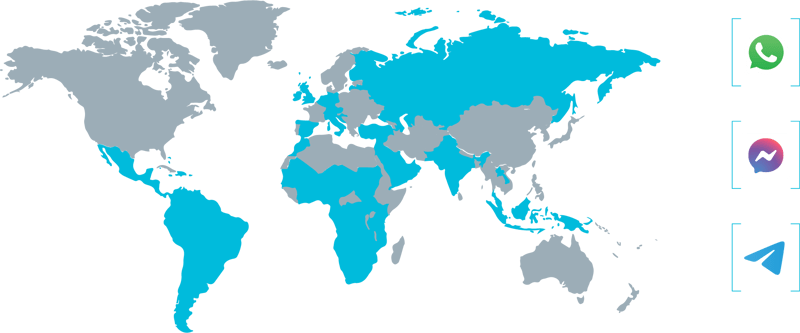WHITEPAPER
How WhatsApp is Changing Business in Emerging Markets
Begin your transformation to secure and compliant communication. Share your information so we can connect.

Download PDF
Executive Summary
The fast, always-on, and interlinked nature of messaging has added unprecedented dynamism to how information is exchanged. WhatsApp stands out for its significant impact on business communications, particularly in emerging markets. It has rapidly shifted from a social, friend-to-friend platform to a full-spectrum, business-to-customer platform.
In international markets, businesses that don’t adopt WhatsApp for business communications might lose to local competitors who have become more adept at establishing communications with their customers.
Understandably, enterprise businesses are right to consider the risks of adopting WhatsApp and similar mobile chat technologies. Companies cannot casually decide to deploy WhatsApp without exposing themselves to threat actors and regulatory compliance constraints. Therefore, enterprises must also secure an end-to-end cybersecurity solution for their WhatsApp users. This way, organizations can meet customers' expectations and enable their employees to drive growth.
WhatsApp Leads The Way
WhatsApp has emerged as a clear leader of the top messaging apps across 180 countries. 2022 research data shows about 40% of the global internet population are WhatsApp users.

In addition to adoption, WhatsApp rules for usage, too. An estimated 2 billion minutes of calls happen daily on WhatsApp, with users spending an average of 18.6 hours monthly (about 36 minutes a day) on the app. For free and far more reliable than SMS, ex-US smartphone owners use WhatsApp for everything.
Consider the evidence:
- As of 2022, 2.44 billion users accessed WhatsApp messenger monthly.
- More than 100 billion messages are sent each day on WhatsApp.
- The US is only third in total WhatsApp user base, with 75 million American users. India tops the list, with 390 million users and growing, followed by Brazil, with 108 million users.
If WhatsApp is where people spend their time, what’s holding your business back from joining them?

From Messages To Real Economic Impact
For enterprise businesses, WhatsApp usage is associated with real economic growth. WhatsApp has been powering economic progress in various countries. Consumers across the African continent have been adopting WhatsApp more.
Different firms in the private sector use WhatsApp to manage their marketing and customer service operations. Even patients and medical professionals have found communicating easier through the app’s photo-sharing features.

The Business Choice is Clear
For enterprises looking to grow in overseas markets, WhatsApp is a must. Mandating email or supervised applications is based on regional hubris and short-sighted to consumer realities in local markets.
When before, businesses and corporations mostly dictated how people communicate with them, now the market leads the way. Case in point: One of our customers, a Fortune 500 pharmaceutical company, has noted that information their field representatives are sending through WhatsApp gets a higher click-through and engagement rate than what they send through email.
Nowadays, you can’t tell the customer to switch to a different communication app because it’s more convenient, or forbid them from using WhatsApp because you can’t secure it. It’s your organization that needs to adjust to customer demand. And if your customers, even your third-party suppliers, prefer to do business through WhatsApp, the opportunity is too big to ignore.
Brands are already taking advantage of the ability to support individual customer concerns or questions, and many anticipate WhatsApp will one day allow micro-targeting marketing messages much the way Facebook currently does (Facebook acquired WhatsApp in 2014).
WhatsApp knows the economic opportunity and continually experiments with new features to help brands and companies connect with consumers more effectively. We also see companies developing brand-specific message bots to field requests using artificial intelligence or WhatsApp for marketing and brand-building campaigns that you might have traditionally seen on Facebook or Twitter.
Businesses that ignore WhatsApp risk losing out in vital markets. Both local competitors and faster-moving global competitors will seize market share.

Secure Human Connections
Ready to see how SafeGuard Cyber secures modern communication apps wherever they exist?
Expert Insights on Cloud App Risks
Stay up-to-date on the latest social engineering, insider threats, and ransomware vulnerabilities.



